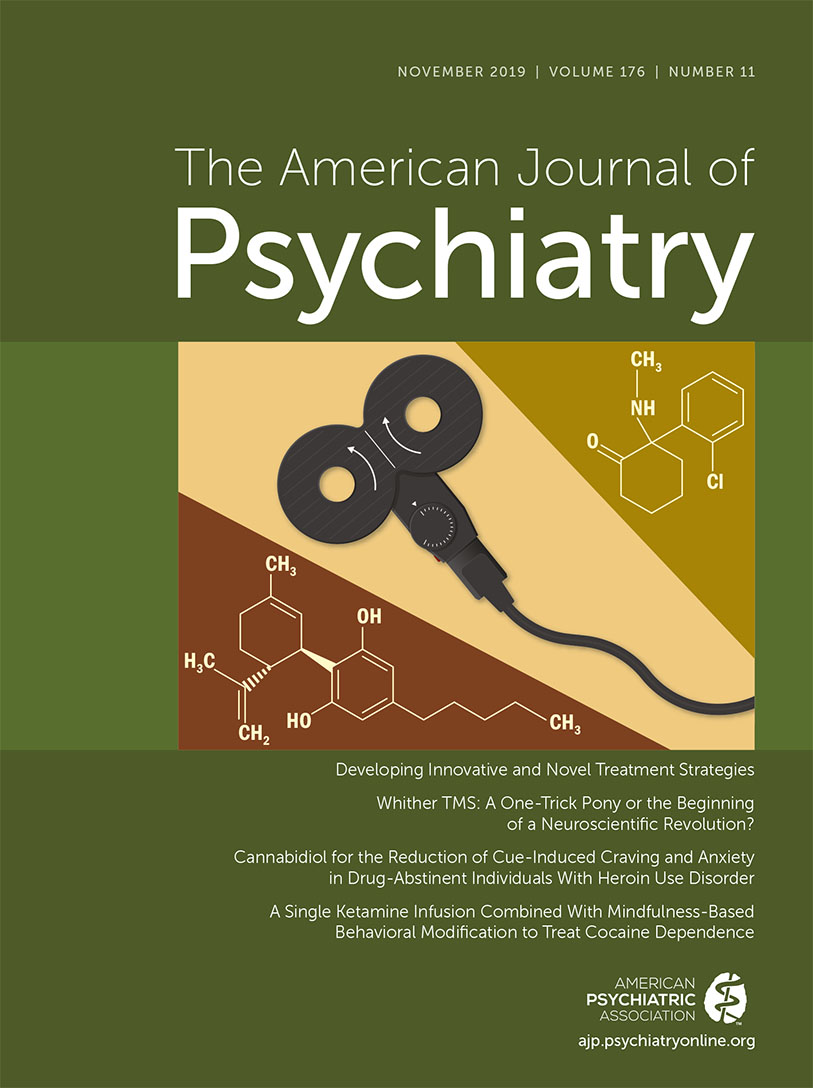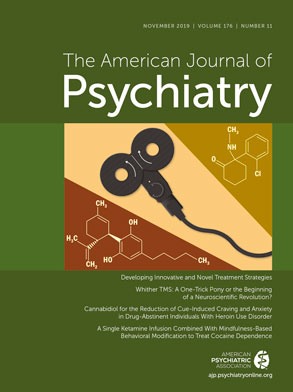The search for an efficacious pharmacotherapeutic treatment for cocaine use disorder has been long and frustrating, with over 100 agents tested in more than 66 placebo-controlled trials, yet not enough positive data to support an indication by the U.S. Food and Drug Administration (FDA) (
1). Animal studies suggest that modulation of glutamate neurotransmission may be of benefit in the treatment of cocaine use disorder, but this approach has not yet demonstrated efficacy in humans. In this issue of the
Journal, Dakwar and colleagues (
2) report on an interesting trial in which they tested a single infusion of ketamine (0.5 mg/kg), a glutamate-modulating drug, compared with an infusion of an active control (midazolam) in adults with cocaine use disorder engaged in a 5-week regimen of mindfulness-based relapse prevention (MBRP). While the sample size was small (N=55), the results were striking. The ketamine-treated group had significantly more abstinence in the last 2 weeks of treatment, significantly less relapse, and significantly less craving. These robust findings across all outcome measures are unusual in trials of cocaine use disorder, which are often plagued by protocol and medication nonadherence, inconsistent findings, and large dropout rates, prohibiting definitive conclusions.
The careful design of the Dakwar et al. study likely facilitated the positive results. Because of data supporting the efficacy of a single dose of ketamine in rapid (but transient) resolution of depressive symptoms, the investigators used a single infusion of medication given during a 5-day hospital stay, making medication adherence a nonissue. Inpatient treatment of cocaine use disorder is uncommon, but in alcohol dependence, studies of the glutamate-modifying agent acamprosate have demonstrated that the medication must be initiated during a period of abstinence to optimize outcomes (
3). In fact, acamprosate is not indicated for the induction of abstinence but rather for the maintenance of abstinence in individuals who have been withdrawn from alcohol. Hence, the period of enforced abstinence, often not a part of the design of trials in cocaine use disorder, may be an important element in the positive results suggesting efficacy of this glutamatergic agent.
Originally approved by the FDA as an anesthetic in 1970, ketamine has been used as an analgesic and anesthetic in human and veterinary practice, and because of its dissociative and euphoric effects, it is also popular among young adults as a “club drug” of abuse in the United States and Asia (
4). The active enantiomer of ketamine, esketamine, has received FDA approval for use in treatment-resistant depression. A small study recently suggested that opioid-related mechanisms may be involved in the antidepressant effects of ketamine (
5). Although the study’s findings are preliminary, they provide a potential mechanism for the abuse potential of ketamine. Hence, it is important to be extremely careful in exploring the use of ketamine and similar agents in the treatment of individuals with substance use disorders, as this group is vulnerable to the development of additional addictive disorders. Considering the growth in the off-label use of ketamine over the past several years (
6), this caution needs to be taken seriously. The role of physicians in the ongoing opioid crisis in the United States should be a cautionary tale.
Participants also received 5 weeks of MBRP, with the first three sessions occurring during the inpatient stay. The investigators hypothesized that ketamine might transiently relieve cocaine use disorder–related cognitive deficits to allow individuals more benefit from behavioral interventions. They also chose MBRP as the behavioral platform because ketamine and MBRP share hypothesized neural mechanisms, such as regulation of mesolimbic functioning, promotion of neural plasticity, and modulation of default-mode network hyperconnectivity. In spite of this persuasive rationale, since both groups received MBRP, the study was not designed to assess the contribution of MBRP to the efficacy of ketamine. In addition, there were no between-group differences over time in measures of stress sensitivity or mindfulness, calling into question the contribution of MBRP to the positive results. As data supporting the use of MBRP in substance use disorders continues to grow (
7), future studies should explore this question specifically.
As the use of alternative therapies, including psychedelic drugs, is growing in psychiatry, more careful investigation of these treatments is sorely needed. Cocaine use disorder and other stimulant disorders are a growing problem in the United States, and treatment options are limited (
8). The authors are to be congratulated for this well-conceived and well-designed study. Innovative thinking coupled with good science and careful study design is likely to be the best path forward.

